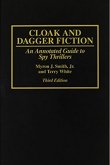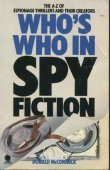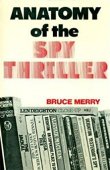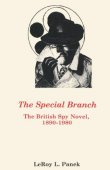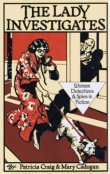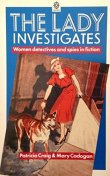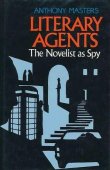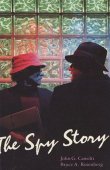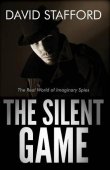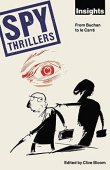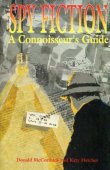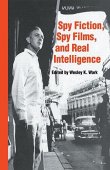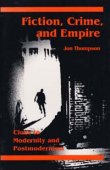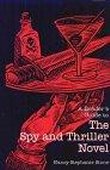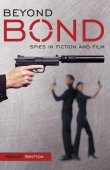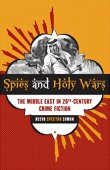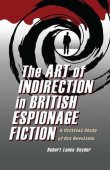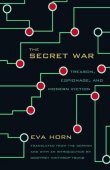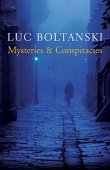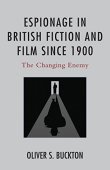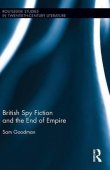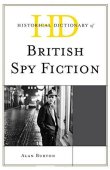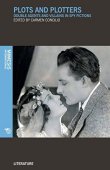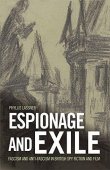On this pageSpy fictionThis page lists books about spy fiction.
|
| Spy fiction | |
Cloak & Dagger Bibliography: An Annotated Guide to Spy Thrillers 1937-1975Myron J. SmithScarecrow Press1976? Third edition, Cloak & Dagger Fiction: An Annotated Guide to Spy Thrillers, by Myron J. Smith and Terry White, published by Greenwood Press in 1995.
"A new edition of the definitive bibliography of the modern spy-adventure-intrigue novel. First published in 1976, this edition has been thoroughly revised and updated. After a discussion of early spy fiction, Smith and White provide a detailed listing of novels from 1940 onward. The bibliography is organized alphabetically, with entries providing brief content annotations. Access is enhanced by cross references as well as appendixes and author and title indexes. Among the new features provided with this edition are a bibliography of articles and books which reflect recent popular scholarship; an appendix, Craft Notes, in which writers themselves speak to concerns of their own choosing; and a glossary of terms on the fascinating and sometimes semantically bizarre language of espionage and spies. As Julian Rathbone writes in his foreword, 'I am delighted that the Editors have given me this opportunity to recommend this new edition of Cloak and Dagger to all aficionados of that branch of fiction which has more to say about the way we live now than any other.' An important reference tool for public and research libraries and their patrons interested in modern fiction and the spy novel." |
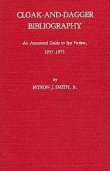 Buy from amazon.co.uk |
Who's Who in Spy FictionDonald McCormickElm Tree Books1977
"The A-Z of espionage thrillers and their creators." |
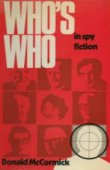 Buy from amazon.co.uk |
Anatomy Of The Spy ThrillerBruce MerryMcGill-Queen's University Press1977
|
Buy from amazon.co.uk |
Special Branch: The British Spy Novel, 1890-1980LeRoy L. PanekUniversity of Wisconsin Press1981
"The author has chosen seventeen of the most important or representative British spy novelists to write about. He presents some basic literary analysis and criticism, trying both to place them in historical perspective and to describe and analyze the content and form of their fiction." |
Buy from amazon.co.uk |
The Lady Investigates, Women Detectives & Spies in FictionPatricia Craig & Mary CadoganGollancz / St. Martin's Press1981
"In the early chapters of this book, the authors examine the crime novels of Wilkie Collins, George R. Sims, Grant Allen, and Anna Katherine Green, and discover the splendid and daunting lady detective Miss Van Snoop. Later on, they explore the period in this century in which women writers made the detective story their own - Christie, Sayers, Allingham, Marsh, and many more." |
Buy from amazon.co.uk |
The British Spy NovelJohn AtkinsCalder1984 A new edition was published in 2010.
"Fiction about spies and spying - a genre of which British writers have generally been the most successful exponents - is a phenomenon which truly began in the twentieth century. Although Dickens's "A Tale of Two Cities" could qualify as spy fiction, it is really with "The Riddle of the Sands" by Erskine Childers that the genre really begins. Since then it has been dominated by writers of varying quality such as John Buchan, Ian Fleming, John Le Carre, and Len Deighton. In this gripping account, John Atkins examines the subject matter of spy fiction and the authors behind it, many of whom worked directly for the British Secret Service. Often life turns out to more incredible than fiction and this is especially true of a form of literature which must feel authentic and credible to the reader." |
 Buy from amazon.co.uk |
Secret Agents In fiction : Ian Fleming, John le Carre, and Len DeightonLars Ole SauerbergSt. Martin's Press1984
"Traces the history of the secret agent genre, discusses the literary quality of spy fiction, and examines the themes used by three top British authors." |
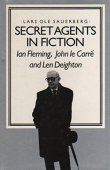 |
Literary Agents: The Novelist as SpyAnthony MastersBasil Blackwell1987
"Spy novels have been one of the most successful literary genres of the 20th century. But how many of their authors were spies themselves? In this book, the author penetrates the shadowy world of British Intelligence in an attempt to uncover some of the less celebrated activities of well-known literary names. From John Buchan during and after World War I and Compton Mackenzie in the tense and suspicious 1930s, the story continues through the World War II exploits of Graham Greene and Malcolm Muggeridge to the post-war era of Ian Fleming and John le Carre. The author explores his subjects' attitudes and responses to their varying experiences and suggests how these experiences were transmuted into fiction - and how the secret services tried to prevent this." |
Buy from amazon.co.uk |
Cover Stories: Narrative and Ideology in the British Spy ThrillerMichael DenningRoutledge1987 The first edition was republished in 2015 as a Routledge Revival.
"First published in 1987, this title tracks the spy thriller from John Buchanan to Eric Ambler, Ian Fleming and John Le Carré, and shows how these tales of spies, moles, and the secret service tell a history of modern society, translating the political and cultural transformations of the twentieth century into the intrigues of a shadow world of secret agents. Combining cultural history with narrative analysis, Cover Stories explores the two main traditions of the thriller: the thriller of the work, in which bureaucratic routines are invested with political meaning; and the thriller of leisure, in which the sports and games that kill time become a time of dangerous political contests. Examining the characteristic narrative structures of the spy novel – the adventure formulas and the plots of betrayal, disguise and doubles – Denning shows how they attempt to resolve crises and contradictions in ideologies of nation and empire, and of class and gender." |
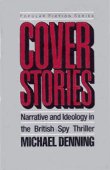 Buy from amazon.co.uk |
The Spy StoryJohn G. Cawelti & Bruce A. RosenbergUniversity of Chicago Press1987
"In this fascinating account of the genre's evolution, John G. Cawelti and Bruce A. Rosenberg explore the social, political, and artistic sources of the spy story's wide appeal. They show how, in a time of bewildering political and corporate organization, the spy story has become increasingly relevant, the secret agent hero expressing the feelings of divided and ambiguous loyalties with which many individuals face the modern world. In addition to a general history of the genre, Cawelti and Rosenberg present in-depth analyses of the work of certain writers who have given the spy story its shape, among them John Buchan, Eric Ambler, Graham Greene, Ian Fleming, and John le Carré.The Spy Story also includes an extensive appendix, featuring a literary and historical bibliography of espionage and clandestinity, a list of the best spy novels and films, a catalog of major spy writers and their heroes, and a selection of novels on espionage themes written by major twentieth-century authors and public figures." |
Buy from amazon.co.uk |
The Silent Game: The Real World of Imaginary SpiesDavid StaffordLester & Orpen Dennys / Viking1988
"The Silent Game traces the history of spy writers and their fiction from creator William Le Queux, of the Edwardian age, to John le Carré, of the Cold War era. David Stafford reveals the connections between fact and fiction as seen in the lives of writers with experience in intelligence, including John Buchan, Compton Mackenzie, Somerset Maugham, Ian Fleming, and Graham Greene. ..... As Stafford suggests, the genre of espionage fiction rarely intends to document the real world of intelligence. Rather, it provides a popular vehicle for exploring themes of imperial decline, international crisis, and impending war." |
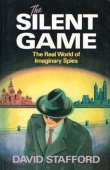 Buy from amazon.co.uk |
Spy Thrillers: From Buchan to le CarreEditor: Clive BloomPalgrave Macmillan1990
"This volume presents thirteen essays on the spy thriller in the twentieth century and includes a critical introduction to the subject. Each essay combines in a clear and understandable way, formal, historical, and aesthetic theory with sound practical criticism. Authors covered range from past masters such as Joseph Conrad and John Buchan to present masters such as Ian Fleming, Len Deighton and John le Carre, whilst subjects range widely from discussion of the formal characteristics of the genre to the conditions governing modern state surveillance and control, of which the spy novel is not only a symptom but also a warning." |
Buy from amazon.co.uk |
Spy Fiction: A Connoisseur's GuideDonald McCormick and Katy FletcherFacts on File1990
"Following an introduction to the genre of detective novels from the mid-1800s to the present day, this reference guide presents biographies of important authors, critical analyses of their work, and additional chapters on treachery, and the treatment of real events in spy fiction." |
Buy from amazon.co.uk |
Spy Fiction, Spy Films and Real IntelligenceWesley K. WarkFrank Cass1991 / 2015
"This collection of essays is an attempt to explore the history of spy fiction and spy films and investigate the significance of the ideas they contain. The volume offers new insights into the development and symbolism of British spy fiction." |
Buy from amazon.co.uk |
Fiction, Crime, and Empire: Clues to Modernity and PostmodernismJon ThompsonUniversity of Illinois Press1993
"Reading fiction from high and low culture together, Fiction, Crime, and Empire skillfully sheds light on how crime fiction responded to the British and American experiences of empire, and how forms such as the detective novel, spy thrillers, and conspiracy fiction articulate powerful cultural responses to imperialism. Poe's Dupin stories, for example, are seen as embodying a highly critical vision of the social forces that were then transforming the United States into a modern, democratic industrialized nation; a century later, Le Carré employs the conventions of espionage fiction to critique the exhausted and morally compromised values of British imperialism." |
Buy from amazon.co.uk |
A Reader's Guide to the Spy and Thriller NovelNancy-Stephanie StoneG.K. Hall1997
"With synopses of 1,372 spy and thriller novels by more than 150 authors, this is simply the most valuable and comprehensive guide for all interested in this popular genre. From the early works of Ian Fleming, Somerset Maugham, and Graham Greene to todays best-sellers by John Le Carre and Tom Clancy, the author catalogs the series characters and creators, period and story locations, and film and television adaptations." |
Buy from amazon.co.uk |
Beyond Bond: Spies in Fiction and FilmWesley BrittonPraeger2005
"In Beyond Bond: Spies in Film and Fiction, Britton traces the history of espionage in literature, film, and other media, demonstrating how the spy stories of the 1840s began cementing our popular conceptions of what spies do and how they do it. Considering sources from Graham Greene to Ian Fleming, Alfred Hitchcock to Tom Clancy, Beyond Bond looks at the tales that have intrigued readers and viewers over the decades." |
Buy from amazon.co.uk |
Neutral Ground: A Political History of Espionage FictionBrett F. WoodsAlgora Publishing2007
"In the grander historical sense, the evolution of espionage fiction reflects the history of a culture for, as the genre evolved, so too did Western society. To explore these historical relationships Neutral Ground: A Political History of Espionage Fiction takes the reader behind the fiction and explores the real-world political, military, and diplomatic events that have consistently and significantly threaded their way through the fabric of the genre. Against this historical timeline, it examines how numerous authors including Rudyard Kipling, Somerset Maugham, Graham Greene, and John le Carré have engaged reality in order to write the espionage novels that have become literary classics and, in selected cases, have also served to alter the course of government policy." |
Buy from amazon.co.uk |
Spies and Holy Wars: The Middle East in 20th-century Crime FictionReeva Spector SimonUniversity of Texas Press2010
"Illuminating a powerful intersection between popular culture and global politics, Spies and Holy Wars draws on a sampling of more than eight hundred British and American thrillers that are propelled by the theme of jihad - an Islamic holy war or crusade against the West. Published over the past century, the books in this expansive study encompass spy novels and crime fiction, illustrating new connections between these genres and Western imperialism. Demonstrating the social implications of the popularity of such books, Reeva Spector Simon covers how the Middle Eastern villain evolved from being the malleable victim before World War II to the international, techno-savvy figure in today's crime novels. She explores the impact of James Bond, pulp fiction, and comic books and also analyzes the ways in which world events shaped the genre, particularly in recent years." |
Buy from amazon.co.uk |
The Art of Indirection in British Espionage Fiction: A Critical Study of Six NovelistsRobert Lance SnyderMcFarland and Co2011
"In contrast to the classical detective story, the spy novel tends to be considered a suspect, somewhat subversive genre. While previous studies have focused on its historical, thematic, and ideological dimensions, this critical work examines British espionage fiction’s unique narrative form, which is typically elliptical, oblique, and recursive. Featured works include eighteen novels by Eric Ambler, Graham Greene, Len Deighton, John le Carré, Stella Rimington, and Charles Cumming, most of which exemplify the existential or serious spy thriller. Half of these texts pertain to the Cold War era and the other half to its aftermath in the so-called Age of Terrorism." |
Buy from amazon.co.uk |
The Secret War: Treason, Espionage and Modern FictionEva HornNorthwestern University Press2013
"The Secret War analyses literary and cinematic depictions of espionage from Rudyard Kipling and T. E. Lawrence to John Le Carré and Steven Spielberg. Horn considers these fictional accounts against the historical development of Western secret services from their inception in World War I to their struggle against current terrorist networks. The Secret War shows the crucial part fictions play in shaping conflicts, constructing 'the enemy,' and deciding political strategies." |
Buy from amazon.co.uk |
Mysteries and Conspiracies: Detective Stories, Spy Novels and the Making of Modern SocietiesLuc BoltanskiTranslation: Catherine PorterPolity Press / John Wiley and Sons 2014
"Crime fiction and spy fiction, paranoia and sociology – more or less concomitant inventions – had in common a new way of problematizing reality and of working through the contradictions inherit in it. The adventures of the conflict between these two realities – superficial versus real – provide the framework for this highly original book. Through an exploration of the work of the great masters of detective stories and spy novels – G.K. Chesterton, Arthur Conan Doyle, John Le Carré and Graham Greene among others – Boltanski shows that these works of fiction and imagination tell us something fundamental about the nature of modern societies and the modern state." |
Buy from amazon.co.uk |
Post-9/11 Espionage Fiction in the US and Pakistan: Spies and TerroristsCara N. CilanoTaylor Francis / Routledge2014
"Post-9/11 Espionage Fiction in the US and Pakistan examines post-9/11 American spy fictions alongside Pakistani novels that draw upon many of the same figures, tropes, and conventions. As the Pakistani texts re-place spy fiction’s conventions, they offer another vantage point from which to view the affective appeals common to these conventions’ usual deployment in American texts. This book argues that the appropriation by Pakistani writers of these conventions insistently tracks how the formulaic and popular nature of post-9/11 American espionage thrillers forwards and reinforces 'appropriate' affective responses, often linked to domestic sites and relations, to 'terrorism.' It also analyses and compares American and Pakistani representations of the twinned figures of the spy (or his proxy) and the 'terrorist,' a term frequently conflated with fundamentalist. The insights of these analyses can serve as interpretive interruptions of non-fictive representations of Pakistani-US 'war on terror' relations." |
Buy from amazon.co.uk |
Espionage in British Fiction and Film since 1900: The Changing EnemyOliver S. BucktonLexington Books2015
"Espionage in British Fiction and Film Since 1900 traces the history and development of the British spy novel from its emergence in the early twentieth century, through its growth as a popular genre during the Cold War, to its resurgence in the early twenty-first century. Using an innovative structure, the chapters focus on specific categories of fictional spying (such as the accidental spy or the professional) and identify each type with a vital period in the evolution of the spy novel and film. .... While exploring the origins of the British spy, tracing it through cultural and historical events, Espionage in British Fiction and Film Since 1900 also keeps in focus the essential role of the 'changing enemy' - the chief adversary of and threat to Britain and its allies - in the evolution of spy fiction and cinema. The book concludes by analyzing examples of the enduring vitality of the British spy novel and film in the decades since the end of the Cold War." |
Buy from amazon.co.uk |
British Spy Fiction and the End of EmpireSam GoodmanRoutledge2015
"The position of spy fiction is largely synonymous in popular culture with ideas of patriotism and national security, with the spy himself indicative of the defence of British interests and the preservation of British power around the globe. This book reveals a more complicated side to these assumptions than typically perceived, arguing that the representation of space and power within spy fiction is more complex than commonly assumed. Instead of the British spy tirelessly maintaining the integrity of Empire, this volume illustrates how spy fiction contains disunities and disjunctions in its representation of space, and the relationship between the individual and the state in an era of declining British power." |
Buy from amazon.co.uk |
Historical Dictionary of British Spy FictionAlan BurtonRowman and Littlefield2016
"The Historical Dictionary of British Spy Fiction is a detailed overview of the rich history and achievements of the British espionage story in literature, cinema and television. It provides detailed yet accessible information on numerous individual authors, novels, films, filmmakers, television dramas and significant themes within the broader field of the British spy story. It contains a wealth of facts, insights and perspectives, and represents the best single source for the study and appreciation of British spy fiction. British spy fiction is widely regarded as the most significant and accomplished in the world and this book is the first attempt to bring together an informed survey of the achievements in the British spy story in literature, cinema and television." |
Buy from amazon.co.uk |
Plots And Plotters. Double Agents And Villains In Spy FictionEditor: Carmen ConcilioMimesis International2016
"The aim of this collection of essays is to explore “negative characters” in the espionage narratives of some of the most esteemed English writers, such as Conrad, Maugham, Ambler, Greene, Fleming, McEwan among others. The role of women is analysed, in particular with the figure of Mata Hari, so as to provide a gender perspective on women as villains and/or double agents. The relationship between literature and film studies is also considered in a comparative approach." |
Buy from amazon.co.uk |
Espionage and Exile: Fascism and Anti-Fascism in British Spy Fiction and FilmPhyllis LassnerEdinburgh University Press2018
"Espionage and Exile demonstrates that from the 1930s through the Cold War British writers Eric Ambler, Helen MacInnes, John le Carre, Pamela Frankau and filmmaker Leslie Howard combine propaganda and popular entertainment to call for resistance to political oppression. Their spy fictions deploy themes of deception and betrayal to warn audiences of the consequences of Nazi Germany's conquests and later, the fusion of Fascist and Communist oppression. With politically charged suspense and compelling plots and characters, these writers challenge distinctions between villain and victim and exile and belonging by dramatising relationships between stateless refugees, British agents, and most dramatically, between the ethics of espionage and responses to international crisis." |
Buy from amazon.co.uk |
